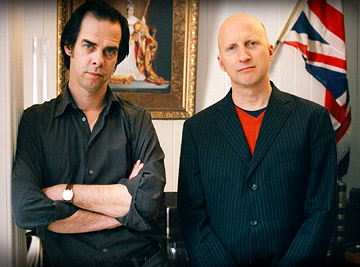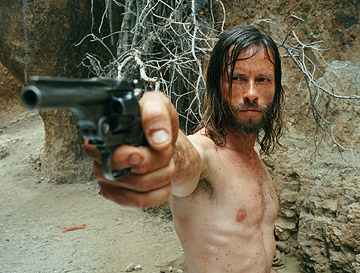

PopEntertainment.com
> Feature
Interviews - Directors >
Feature Interviews K to O
> Nick Cave
 NICK
CAVE
NICK
CAVE
OFFERS
HIS PROPOSITION
by Brad Balfour
Copyright
©2006 PopEntertainment.com. All rights reserved.
Posted:
May 12, 2006.
Though Nick Cave
didn't direct the Australian period drama The Proposition he did
write and help shape it. Working closely with the actors such as lead Guy
Pearce and Danny Huston, his longtime collaborator director John Hillcoat
encouraged Cave to critique their concept of the characters, the Burns
brothers.
Together they gave
this trio the multi-faceted hardscrabble qualities that make such
memorable characters. Set in Australia's Outback of the 1880s, the
brothers Burns are highly sought-after criminals who have their way around
the territory, After the rape and murder of a settler family by older
brother Arthur (Huston), brother Charlie
(Pearce) and younger brother Mikey (Richard Wilson) are caught in a shoot
out. Offered a proposition by Captain Stanley (Ray Winstone), Charlie and
sibling can go free if Charlie finds and kills his older outlaw brother.
Otherwise Capt. Stanley who is intent on bringing to them justice, will
hang Mikey on Christmas Day, if Charlie fails to comply.
This is perfect
material for Cave who started his career as leader frontman of the
Birthday Party – the hardedge post punk band equal in power to Public
Image Limited or Bauhaus. Once they broke up, he formed the Bad Seeds and
further explored the dark desolate realms of music and emotion.
How did you come to
write the script for John Hillcoat?
I've known him for
about twenty years, and for about eighteen of them he's been talking about
the Australian western he's going to make and that I would do the music.
I've continued to work with him through that eighteen years and eventually
he commissioned a script, that got written, which was basically an
American western kind of dumped in Australia and we both thought that that
was not the sort of thing he wanted to do. And then he went, "Well fuck
it, you write it then." So, I did.
I wrote it very
quickly; it took three weeks to write because I refused to invest anymore
time in something that I basically knew would never ever get made. After a
couple of difficult years he actually got it made.
 Was this story based
on any real events?
Was this story based
on any real events?
No, it was all
fake.
How did the
conventions of American westerns influence you in writing the script?
I think John's
heavily influenced by the anti-westerns and revisionist westerns of the
'70s – McCabe & Mrs. Miller and Peckinpah's stuff. But I think we
felt that the average Australian had a different view of their history
than the average American.
I don't think we see
things so much in black and white, or good guys and bad guys, or villains
and heroes. We have a much more conflicting, ambiguous shame-faced view of
our history. I think we basically see it as a history of failure and
incompetence.
What's the source of
that shame?
If you look at a lot
of stories like Ned Kelly and stuff like that; the antics they got
up to are hilarious and foolish, and you see how kind of doomed they are.
And so, our heroes are murky characters. So, we wanted to write a story
where you go to a film and expect your radar to focus on who's the one to
sympathize with and who's the one you want to see get their comeuppance at
the end. This radar is confused throughout and sometimes you feel aligned
to one character and then you shift your allegiance to somebody else, and
that in the end they are a group of people in a place that they should
never be and they're being slowly dismantled by their own folly.
There is a lot of
violent imagery in the movie, and anyone who knows your music would
probably be familiar with it, so it wouldn't be that shocking. How did
John influence the violent tone of the movie?
John is very
interested in violence. If you see his first and second films, he is
certainly interested in the aftermath of violence and where violence takes
you. I guess when John does violence he does it fast and brutal and it's
ugly and out of the way. Then he deals with the ramifications of that.
That's what he's primarily interested in.
People talk about
this film being a violent film, which I find slightly irritating because
the stuff that comes out of Hollywood are great ballets of violence.
[Hollywood] scripts are being written for the express purpose of just
having a whole lot of violence like Tarantino films which I find pretty
unwatchable most of the time. So when John deals with violence, I think he
deals with it in a realistic way and that it's a fundamental part of the
story. It was a violent time and a violent so-called 'civilizing' of the
country.
 You've written your
scripts pretty quickly, but your music takes much longer. What is the
difference four you between those two things?
You've written your
scripts pretty quickly, but your music takes much longer. What is the
difference four you between those two things?
To write a song and
see it through to the end is really hard work. It's not building a house
or bricklaying or anything like that, but for me it's a very difficult
process and the hardest part of it is when you're trying to start off a
song. I'm sitting alone in my office and I'm trying to think about what I
want to write about, and all I am is sort of exhausted by my own tiresome
kind of opinions about things, and all of this bullshit that I've got in
my head. It's very difficult to get through that and actually call
together some kind of a song.
Whereas when I'm
writing a script, when someone says write an Australian western, you don't
have to worry about how you feel about anything, or your own ideas about
anything. You just sit there and get a few characters; the story has its
legs.
Did you write any of
the music you composed for
The Proposition
while writing the script?
Yeah, the script has
all of the musical cues in it. You know, into the violins and all of that
sort of stuff. So, I was writing that as I was writing the script. I think
the script is kind of musical.
You have a double
DVD that's coming out –
Nick Cave And The
Bad Seeds -Road To God Knows Where /Live At The Paradiso. Have you
looked at them?
No, I never look
over my stuff. It just puts me off my game. I'd rather live in a kind of
fantasy world that what I do is brilliant, and I don't really ever want to
kind of actually see it for what maybe it really is. So I never listen to
my music, I never watch myself on TV or, especially, footage of myself
live.
Email us Let us know what you think.